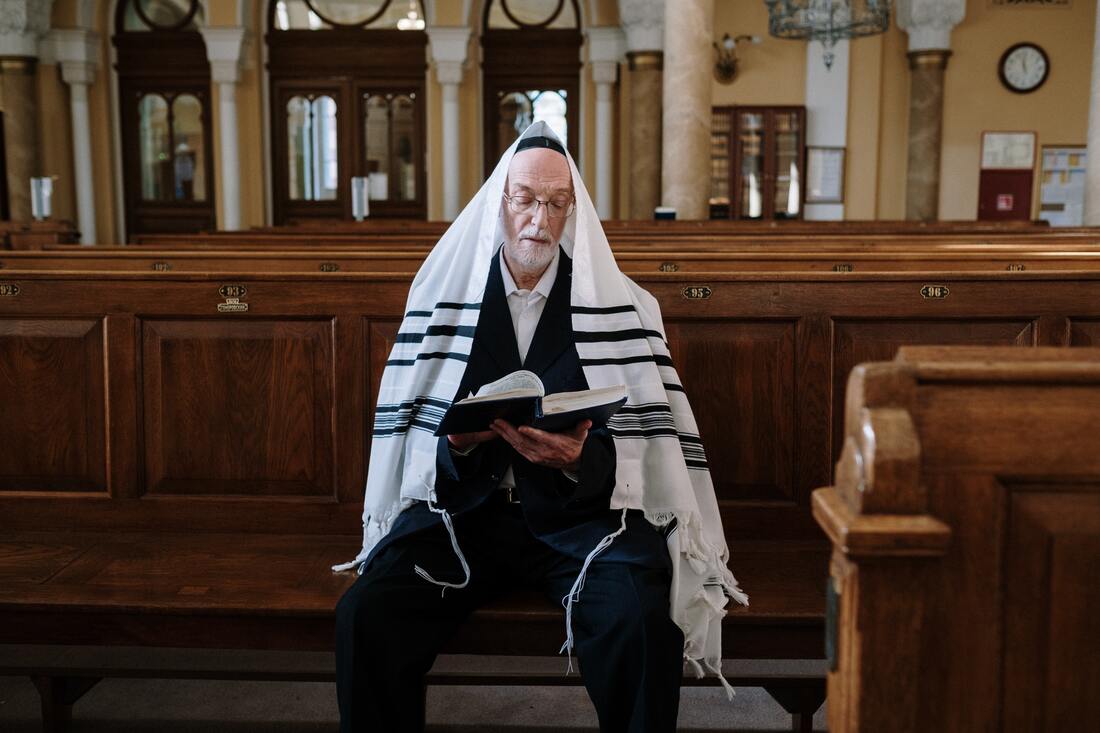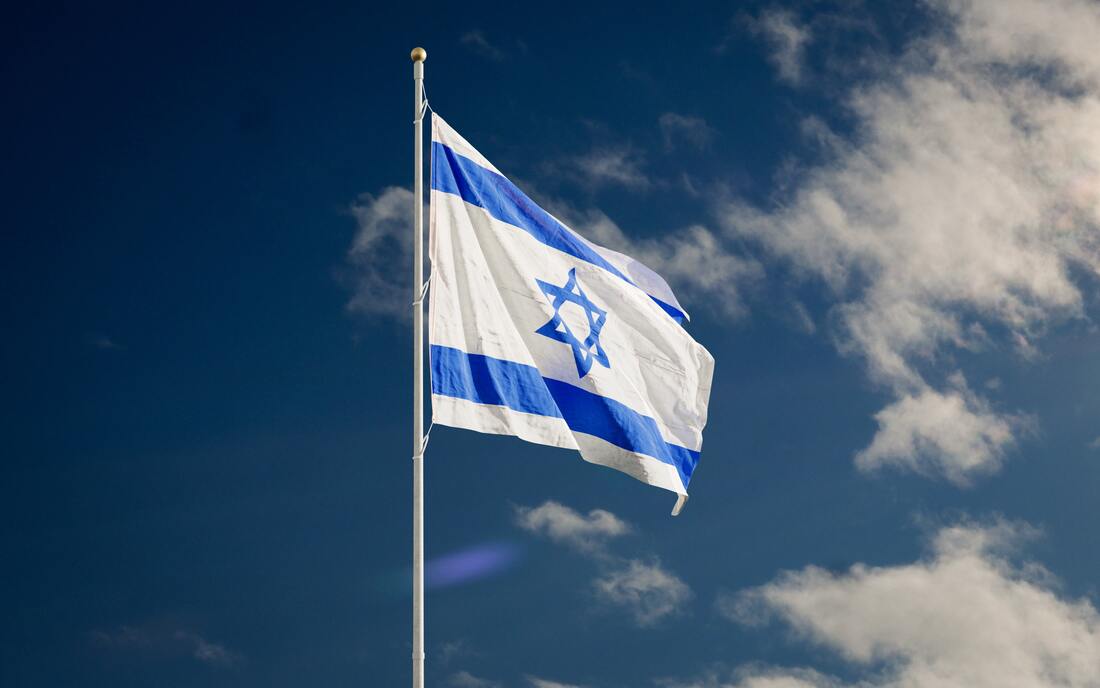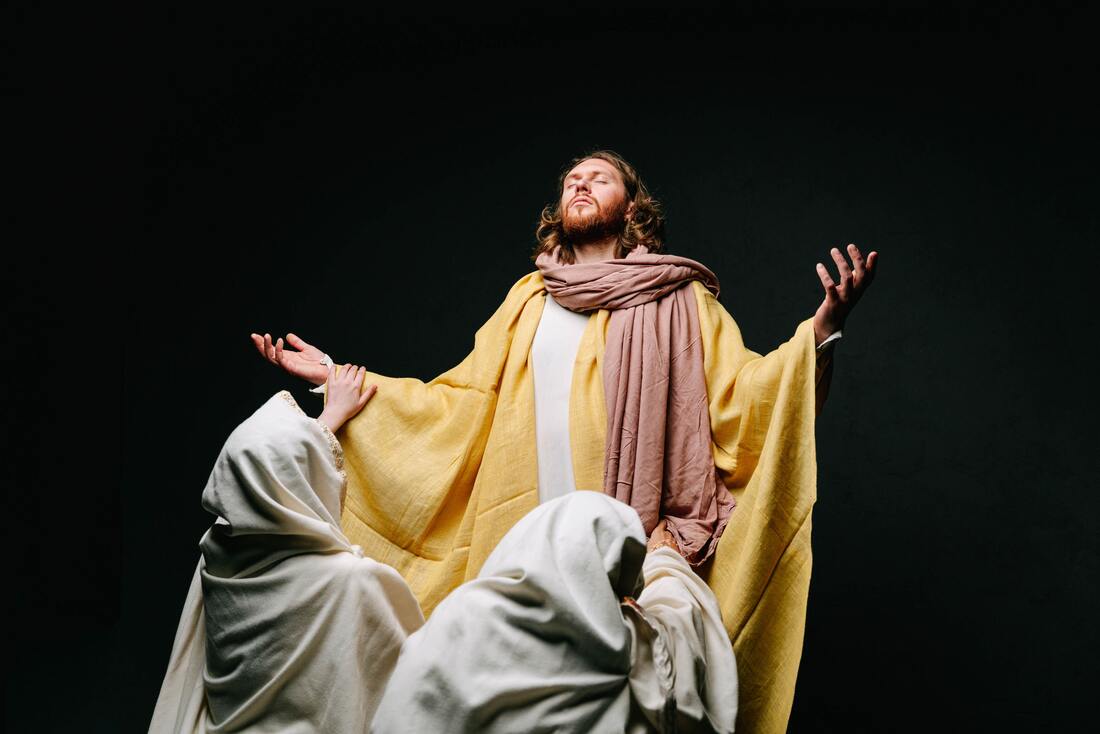|
On the Jewish calendar, the first month of the civil year and the seventh month of the religious year coincide. The seventh month is called Tishrei, meaning beginning. Seven is the number of completion or perfection, so it is significant that the three fall feasts occur in this month. The New Year occurs on the first day of this month. The celebration, also known as Rosh Hashanah or The Feast of Trumpets, occurs at sundown on September 15 on our calendars. The shofar, an instrument made of a ram's horn, will be blown to call the Jews together so they can consider the past year and look at the year ahead. The sound is meant to awaken the souls of those who hear it so that they are prompted to return to God. The horn brings to remembrance the ram that Abraham offered to God as a sacrifice in place of his son, Isaac. It is also a reminder for God's people to remain humble in the face of a holy God.
Another name for the Jewish New Year is "The Day of Judgment." It begins the fall feasts. These feasts are meant to lead those celebrating into right standing with God. Joel 2:1 commands, "Blow the trumpet in Zion; sound the alarm on my holy hill." The shofar is sounded 100 times at Rosh Hashanah. Not only does it call for a gathering of God's people, but it also reminds them to go to war against anything that is contrary to God's truth. We should be encouraged by the words of Joel 2:12-15. "'Even now,' declares the Lord, 'return to me with all your heart, with fasting and weeping and mourning.' Rend your heart and not your garments, return to the Lord your God, for He is gracious and compassionate, slow to anger and abounding in love and He relents from sending calamity. Who knows? He may turn and relent and leave behind a blessing...Blow the trumpet in Zion, declare a holy fast, and call a sacred assembly." God is focused on our redemption. The New Year is to be a time for a reset for all of humanity after a time of self-reflection and repentance. The number of the year is one that speaks to us about the Lord's intentions. In order to follow what many of the prophets are saying about the year to come, we must understand that every letter in the Hebrew alphabet is a picture that conveys a message and has a numerical value. 5784 is the number of the New Year. The fourth Hebrew letter is "Dalet" and has a pictographic meaning of a door or portal. God created the sun, moon, and stars on the fourth day, and their light separates us from darkness. These celestial bodies indicate our times on the calendar. Thus, our Creator regulates our times and seasons, and Tishrei is meant to demonstrate the linking of time and authority. Let us look at all the numbers of this year: Five is the number of grace. Seven is the number of perfection. Eight is the number of new beginnings. And four is the number of a door. We are four years into the decade of the 80s. This number 80 is the seventeenth letter of the Hebrew alphabet and is the picture of a mouth. It is called "Pey" and is associated with speech and other functions of the mouth like blowing. What does this say to us as we consider the year 5784? Remember that God created the world with His spoken word. Since we are made in His image, our sounds have power as did His. We have been given the power to bless or curse. Proverbs 18:21 tells us, "The tongue has the power of life and death..." Then we have Psalm 81:10 that promises, "...Open wide your mouth and I will fill it." God is the one who fills us with good things! The ten days between Rosh Hashanah (The New Year) and Yom Kippur (The Day of Atonement) are called The Days of Awe because the Jews believe their actions during these ten days can alter the decree God writes about them in His heavenly book. I believe we have a great opportunity to walk through new doors in the year to come. Perhaps this is time for us to experience growth in a new dimension—the fourth or spiritual dimension. Believers have legal access to the spirit realm. Ephesians 2:6 confirms this: "God raised us up with Christ and seated us with Him in heavenly realms in Christ Jesus." Could the declaration of our faith move us into a season of creation that we have not seen before? We must embrace the promises of God by declaring them so that the door of blessing and opportunity is open for us. Let it be! In just two weeks, the Jews will be celebrating their New Year, Rosh Hashanah. Central to their celebration is the reading of the story of Abraham and his willingness to sacrifice his son, Isaac, at the command of God. Because of his act of faith in God, Abraham has become known as The Father of Faith. He began to demonstrate faith when God first spoke to him at the age of 75. God said to him, "Go from your country, your people, and your father's household to the land I will show you. I will make you into a great nation, and I will bless you; I will make your name great, and you will be a blessing. I will bless those who bless you, and whoever curses you I will curse; and all people on earth will be blessed through you." (Genesis 12:2-3) Abram, as he was known then, put feet to his faith and set out for the Promised Land.
Abram had another encounter with God when he was 99 years old. God said to him, "As for me, this is my covenant with you. You will be the father of many nations. No longer will you be called Abram; your name will be Abraham, for I have made you a father of many nations." (Genesis 17:4-5) To seal the promise God was making, He required all males to be circumcised as a sign of this everlasting covenant. Faith was to become the key for all nations to be part of the family of God. That faith must be established through our belief that Jesus Christ is the Son of God and died for our sins. If we make this decision, the righteousness of Christ is given to us. Romans 4:9 tells us that "Faith was credited to Abraham as God's righteousness!" (TPT) Faith in God and righteousness go hand-in-hand. Romans 4:3, in The Passion Translation, explains this. "Because Abraham believed God's words, his faith transferred God's righteousness into his account." Romans 4 also makes it clear that this righteousness is available to every person on the face of the earth. Look at Romans 4:10-11. "How did he (Abraham) receive this gift of righteousness? Was he circumcised at the time God accepted him, or was he still uncircumcised? Clearly, he was an uncircumcised gentile when God said this of him! It was later that he received the external sign of circumcision as a seal to confirm that God had already transferred His righteousness to him by faith, while he was still uncircumcised." (TPT) God's promises to Abraham were ultimately fulfilled through Jesus Christ who is in Abraham's line. Notice that God did not select a perfect man in Abraham. We can see the mistakes that he made and sins that he committed. He learned through these and grew in faith. The ultimate test of his faith was when he was told to sacrifice Isaac, his only son. He traveled approximately 50 miles to Mount Moriah and had an abundance of time to reconsider what he was about to do. But Abraham demonstrated that he loved God more than he loved the promise. Through his commitment to follow God's command, he was rewarded with blessings that confirmed his faith in God. We can be assured that our faith in God will be tested. That is the only way for it to grow. God wants to increase His righteousness in our "accounts" through increasing our faith. Why else would He send his Son to earth to die? "God made Him who had no sin to be sin for us, so that in Him we might become the righteousness of God." (2 Corinthians 5:21) It seems to me that when we pass our tests, we get a double bonus: increased faith and righteousness. "A Haven in Time"—that is what the month of Elul is called. We entered into this sixth month on the Hebrew calendar on Thursday evening. Why is Elul called a haven? It is because our God, the God of Abraham, Isaac, and Jacob, appointed this time as one where His mercy and forgiveness are extended to us in a personal way. If we look back at the history of the children of Israel, we see that the prior two months (Tammuz and Av) are known for the sins committed against the Lord. Because of their sins of lust and unbelief, the Israelites built the golden calf and refused to enter the Promised Land. Elul is meant as a time for repentance and redemption.
Today, God reaches out to us even in the midst of our sin. His overwhelming desire for intimacy with us overrides any anger over our disobedience. During Elul, He extends the opportunity for us to prepare for the high holy days of the next month through repentance now. The Lord extends mercy in a very personal way by making Himself more accessible to us. The Jewish people say of Elul: "The King is in the field." God's desire for intimacy with us is so great that He leaves His heavenly dwelling to come to earth and make Himself accessible in the field of our lives. We have an entire month when the Lord is here to remind us of His loving kindness and love. For me, it is particularly significant that God picked the month of Elul to send the angel Gabriel to tell Mary about God's plan to use her to birth His son. "In the sixth month, God send the angel Gabriel to Nazareth, a town in Galilee, to a virgin pledged to be married to a man named Joseph, a descendant of David. The virgin's name was Mary...the angel said to her, 'Do not be afraid, Mary, you have found favor with God. You will be with child and give birth to a son, and you are to give him the name Jesus.'" (Luke 1:26-27, 30-31) "...So, the Holy One to be born will be called the Son of God." (Luke 1:35) During the month of Elul, God took His first step to put into motion His plan for His Son to come to earth to live in a tent of flesh for 33 years. John 1:14 describes what happened: "The Word became flesh and made His dwelling among us." The Passion Translation gives us a good visual of John 1:14. "And so the Living Expression became a man and lived among us! And we gazed upon the splendor of His glory, the glory of the One and Only who came from the Father overflowing with tender mercy and truth." God's desire has always been to dwell with us. Look back to Exodus 25. In this part of Scripture, the Lord instructs Moses to build Him a tabernacle. Verse 2 says, "...You are to receive the offering for Me from everyone whose heart prompts them to give." The purpose for the tabernacle is described in Verse 8. "Then have them make a sanctuary for Me, and I will dwell among them." It is hard to imagine such a loving God. The Lord made the ultimate sacrifice for us so that we could live with Him for eternity. "This is love: He loved us long before we loved Him. It was His love, not ours. He proved it by sending His Son to be the pleasing sacrificial offering to take away our sins." (1 John 4:10 - TPT) During Elul, God gives us an invitation to experience deeper measures of HIs love. It is so fitting that the name Elul is a Hebrew acronym, "Ani L'dodi V'dodi Li" which means "I am my beloved’s, and my beloved is mine." (Song of Solomon 6:3) Should we not respond positively to God's loving invitation for intimacy? Let us be sure that our hearts are clean, open, and prepared to experience Him in this haven in time. It is common for different emotions to partner with one another. For example, Nehemiah 8:10 tells us that, "The joy of the Lord is our strength." When we have joy based on the truth that the Lord is our salvation, refuge, and guide, an inner strength grows in us. On the other hand, when we look at negative emotions, fear frequently travels with doubt and unbelief. This combination was a major problem for the children of Israel when they came out of Egypt. God made promises to all of Israel that have become known as the "Five I Wills." (1) "I will bring you out from under the yoke of the Egyptians." (2) "I will free you from being slaves to them." (3) "I will redeem you with an outstretched arm and with mighty acts of judgment." (4) "I will take you as my own people, and I will be your God." (5) "I will bring you to the land I swore with uplifted hand to give to Abraham, to Isaac, and to Jacob. I will give it to you as a possession." (Exodus 6:6-8)
God proved His faithfulness to the Israelites by bringing plagues upon the Egyptians that did not touch them. In addition, He brought them out from under the yoke of slavery with plunder. In a mighty show of power, the Lord opened the Red Sea for all of Israel to walk through and then drown the armies of Egypt. In celebration, the Israelites sang, "The Lord is my strength and my defense; He has become my salvation." (Exodus 15:2) Guiding His people with a cloud by day and a pillar of fire by night, He was with them every step of their journey. He healed the bitter waters of Marah, so that they could have drink. He brought them manna daily. He helped defeat the Amalekites. At Mount Sinai, they were given God's commandments to follow, and they made a covenant with God. "We will do everything the Lord has said; we will obey." (Exodus 24:7) When the Israelites reached Canaan, at the Lord's command, Moses sent twelve leaders of the tribes of Israel into the Promised Land to investigate. After exploring for 40 days, they returned with a report. Ten of the leaders spread a bad report and doubt that led to fear concerning God's promises arose. Psalm 78:11 says, "They forgot what He had done, the wonders He had shown them." Psalm 106:13 reports, "But they soon forgot what He had done and did not wait for His plan to unfold." The bad report from the explorers caused the people to lose faith in God. They doubted their ability to occupy their God-given inheritance. Unbelief and fear overrode faith, and they refused to move forward into the land that God had promised them. According to Rabbinic tradition, the children of Israel refused to enter the Promised Land on the ninth of Av. This refusal set into motion yearly disasters, including the destruction of the first and second temple, that all occurred on the ninth of Av. The writer of Hebrews describes God's decision concerning the future of the children of Israel who were rescued from Egypt. "So, God swore an oath that they would never enter into a calming place of rest all because they disobeyed Him. It is clear that they could not enter into their inheritance because they wrapped their hearts of unbelief." (Hebrews 3:18-19 - TPT) The month of Av begins this week; the ninth of Av is on July 27 this year. It would be beneficial for us to remember His faithfulness in our lives, and to meditate on the promises that God has given us. If we find doubt or fear arising, we must resist it and, by faith, claim His promises. It is faith that conquers doubt. Although the Jews mourn on this day, they also proclaim God's greatness. "You turn my wailing into dancing; you removed my sackcloth and clothed me with joy, that my heart may sing your praises and not be silent. Lord my God, I will praise you forever." (Psalm 30:11-12) A significant event occurred during the fourth month on the Hebrew calendar that should be a warning for all of us. The event broke the first commandment given by God to the Israelites. "You shall have no other gods before me." (Exodus 20:3) While Moses was on the top of Mount Sinai receiving God's commandments, God's people neglected to remember and review the miraculous events of the past 2-1/2 months. They closed their eyes to the truth and said to Aaron, the priest, "...Make us a god who shall go before us..." (Exodus 32:1 – The Hebrew Bible, 1945) They collected their gold earrings to use in the making of an idol cast into the shape of a calf. Then they told themselves a lie: "This is thy god, O Israel, which brought thee out of the land of Egypt." (Exodus 32:4 - The Hebrew Bible, 1945)
Does this behavior seem familiar? In my opinion, the Church has allowed our country's leadership to rewrite history. We have forgotten that our nation was founded upon a Judeo-Christian foundation. We now worship the idols of money, sex, self-indulgence, laziness, and materialism, to name a few. Our golden calves, so to speak, have taken over our lives, and we worship at our human-made altars. We can learn much during this fourth month called Tammuz. The religious Jews of today are particularly mindful of the sins of their past and the repercussions that have ensued. They have designated the three weeks between the 17th of Tammuz and the 9th of Av (the fifth month) as a time to fast as they recall the tragedies that beset the Jews because of idolatry. These three weeks of sorrow are called "bein ha-Metzarim" or "between the straights." On the web site, "Hebrew4christians.com" there is an explanation of why the fourth month is called Tammuz. Apparently, this is the name of an idol that was worshiped in the Ancient Near East. They write, "Sages tell us it was deliberately chosen (the name Tammuz) to remind the Jews of the judgment that comes from idolatry. It eventually led to the destruction of the Temple." Idolatry led to the destruction of the first and second temples on the same day (the ninth of Av) in different years. Here is a lesson for all of us. As we worship idols, we destroy our temples. "Don't you know that you yourselves are God's temple and that God's spirit dwells in your midst? If anyone destroys God's temple, God will destroy that person; for God's temple is sacred, and you together are that temple." (1 Corinthians 3:16-17) "Do you not know that your bodies are temples of the Holy Spirit, who is in you, whom you have received from God? You are not your own; you were bought at a price. Therefore, honor God with your bodies." (1 Corinthians 6:19-20) We should use this month of Tammuz to recall the goodness of God throughout the years. The antidote to idol worship is the worship of our One True God, the Lord Jesus Christ. Let us step away from the idols that ensnare us and join together in a chorus of blessing to honor our Lord. The mention of fire in the Bible brings to mind images of light, cleansing, and power, and frequently represents God. In Deuteronomy 4:23-24 we read about how Moses warned the children of Israel. "Be careful not to forget the covenant of the Lord your God that He made with you; do not make for yourselves an idol in the form of anything the Lord your God has forbidden. For the Lord your God is a consuming fire, a jealous God." If we look back to the days when God called Abram to the land of Israel, we see that He made a covenant with him and came as fire in the process. "When the sun had set and darkness had fallen, a smoking firepot with a blazing torch appeared and passed between the pieces. (of the animals for sacrifice) On that day the Lord made a covenant with Abram..." (Genesis 15:17-18) In Abram's day it was a custom to light a torch when a covenant was being made. God was making a promise to Abram to give him the land of Israel as an inheritance. The fire moving through the pieces of the sacrifice represented God.
The glory of God was manifest through fire during all of Moses' visits to Mount Sinai. Exodus 19:18 tells us, "Mount Sinai was covered with smoke, because the Lord descended on it in fire." During one of his visits to The Mountain of the Lord, God gave Moses instructions for Aaron and his sons regarding the tabernacle altar. "The fire must be kept burning on the altar continuously; it must not go out." (Leviticus 6:13) It was the fire that consumed the sacrifice. The prophet Elijah demonstrated the power of the One True God to the prophets of Baal and all the people of Israel. A bull was placed on the altar of the prophets of Baal and one on the altar of Elijah. Elijah declared, "The god who answers by fire—he is God." (1 Kings 18:24) A pillar of fire guided the Israelites out of bondage in Egypt to the Promised Land. This pillar of fire also gave protection to the Israelites when the Egyptian army pursued them. "Then the angel of God, who had been traveling in front of Israel's army, withdrew and went behind them. The pillar of cloud also moved from the front and stood behind them." (Exodus 14:19) The familiar image of fire from the Old Testament is repeated in the New Testament. Before Jesus left the earth and returned to His Father, He instructed His disciples not to leave Jerusalem. He had a gift for them. "But you will receive power when the Holy Spirit comes on you; and you will be my witnesses in Jerusalem, and in all Judea and Samaria, and to the ends of the earth." (Acts 1:8) Jesus knew that many people would be coming to Jerusalem to celebrate the Feast of Weeks or Shavuot. His followers had been counting the weeks from Passover to the celebration of the wheat harvest and the giving of Torah. Another aspect was about to be added to this festival. As the disciples waited in the Upper Room in Jerusalem, "Suddenly a sound like the blowing of a violent wind came from heaven and filled the whole house where they were sitting. They saw what seemed to be tongues of fire that separated and came to rest on each of them. All of them were filled with the Holy Spirit..." (Acts 2:2-4) Fire came again, as it did throughout the history of the children of Israel, to deliver them from fear and to empower them to move into God's mission to build His church with both Jew and Gentile. Today is that day when the Church celebrates Pentecost or Shavuot. We have also been given the gift of power through the Holy Spirit so that we can carry God's Spirit to the world. Let us keep the flames of the Spirit burning through our humility and worship of the One True God. Pray, "Lord, set our hearts on fire so that we become blazing torches to bring the nations to You." In 1948, Iyar 5 on the Hebrew calendar, and May 14 on our western calendar, the nation of Israel was born. David Ben-Gurion, Israel's first prime minister, stood in a Tel Aviv art gallery to read the nation's Declaration of Independence and declare that the Jewish State would be called "Israel." Long ago, God chose the Jewish people to demonstrate His promise-keeping character to the world.
If we look back to the time when the Israelites crossed into the Promised Land and drove out the unrighteous nations, we see that they forgot the way God provided for, empowered, and protected them. They quickly rebelled and angered the Lord to such a degree that He declared, "I will scatter you among the nations..." (Leviticus 26:33) Indeed, this is what happened several times. AD 70 was known for a huge dispersion when the Romans destroyed Jerusalem and scattered the Jews around the world. The Jewish people are tenacious and clung to the promises of God through their years of exile. Amos 9:14-15 was one of these promises. "I will bring my people Israel back from exile. They will rebuild the ruined cities and live in them. They will plant vineyards and drink their wine; they will make gardens and eat their fruit. I will plant Israel in their own land, never again to be uprooted from the land I have given them..." For centuries, the Jews made aliyah (immigration to Israel). When Germany initiated World War II, aliyah came to a holt and six million Jews were killed before the war ended. The importance of having a homeland for the Jews became obvious. So it was, in 1948, that the Jewish dream of having their homeland restored became a reality. The young nation would immediately face a battle as five surrounding Arab nations with well-trained soldiers and abundant equipment came against them. It was only through a miracle of God that Israel prevailed. The question asked in Isaiah 66:8 was answered with a resounding "Yes!" "Can a country be born in a day, or a nation be brought forth in a moment?" Since 1948, Israel has been challenged by enemy forces on several occasions. With God's help they have prevailed and built Israel into one of the most prosperous nations in the world. Israel's first prime minister, David Ben-Gurion, said it well: "In Israel, in order to be a realist, one must believe in miracles!" And the God of Abraham, Isaac, and Jacob is just that--He has been their consistent help and deliverer. He has guided them and helped as Israel transformed a once inhospitable region into a garden. According to the book Israel, 75 Years of Miracles, this small nation has "become a world leader in science and technology and in health and medicine." We should celebrate this 75-year anniversary with the people of Israel as this nation is God's demonstration of His faithfulness and love for a people He calls His own. God continues to gather His people back from the lands where they were scattered. The covenant He made with Abraham has been kept, and the land and people will continue to thrive beyond this Diamond Jubilee. In his second book, Acts, Luke makes it clear that Jesus appeared to his disciples for 40 days after His resurrection from the dead. Jesus dedicated those 40 days to helping His disciples understand the Scriptures and to explaining the Kingdom of God and the power of the Holy Spirit to them. We are currently in the same 40-day time period between the resurrection of Jesus and His ascension.
The disciples were given a life calling which has been handed down to us. Jesus told them, "All authority in heaven and on earth has been given to me. Therefore, go and make disciples of all nations, baptizing them in the name of the Father and of the Son and of the Holy Spirit, and teaching them to obey everything I have commanded you. And surely I am with you always, to the very end of the age." (Matthew 28:18-20) The gospel of Mark gives more detail about the power and authority for the disciples. "And these signs will accompany those who believe; in my name they will drive out demons; they will speak in new tongues; they will pick up snakes with their hands; and when they drink deadly poison, it will not hurt them at all; they will place their hands on sick people, and they will get well." (Mark 16:17-18) In the gospel of Luke, we are told that Jesus "opened their minds so they could understand the Scriptures." He reminded them of this: The Messiah will suffer and rise from the dead on the third day, and repentance for the forgiveness of sins will be preached in His name to all nations, beginning at Jerusalem. You are witnesses of these things. I am going to send you what my Father has promised; but stay in the city until you have been clothed with power from on high." (Luke 24:45-49) John includes some stories of the disciples' encounters with Jesus that are not in the other three gospels. One story recounts the appearance of Jesus to Peter, Thomas, Nathaniel, James, and John as they fished on Lake Galilee. He instructs them to fish on the starboard side of the boat after they caught nothing. Their catch was so large that it made pulling in their net almost impossible. Scripture tells us there were 153 fish in the net, a number that represents the harvest that was to come from the people groups of the world. (Footnote from The Passion Translation) Before Jesus ascended, He advised His disciples to stay in Jerusalem until the power of the Holy Spirit came upon them. (Acts 1:4) Can you imagine the conversation that took place among the disciples as they waited for the infilling of the Holy Spirit? They probably spoke about the events of the last three years of their lives with Jesus and wondered what the next chapter would look like. The 50 days between the Resurrection and Pentecost should also be one of review and preparation for us. There is always more with Jesus! Perhaps we will have a new perspective on our lives as we wait upon the Holy Spirit to reinvigorate and renew us. The Bible tells us, "Wait for the Lord; be strong and take heart and wait for the Lord." (Psalm 27:14) The one who created the heavens and the earth existed before there was creation. Genesis 1:1 used the Hebrew word Elohim which translates God, Mighty Creator, Omnipotent Power. With His breath He made everything from nothing, spoke order into chaos, and light into darkness. Elohim is the plural form of El that gives recognition to the truth that He is a Triune God—Father, Son, and Holy Spirit. On the sixth day "God created man in His own image..." (Genesis 1:27) His desire was and is to fill our lives with blessings. Psalm 102:27 tells us about the infinity of God. "But you remain the same, and your years will never end."
After destroying life on earth because of its wickedness, God started again with Noah and his family and demonstrated that He is the God who keeps covenant with His people. Nations were birthed from Noah's sons, Shem, Ham, and Japheth. From Shem's family came Abram and another covenant with God. God said, "I will make you into a great nation, and I will bless you; I will make your name great, and you will be a blessing. I will bless those who bless you, and whoever curses you I will curse; and all peoples on the earth will be blessed through you." (Genesis 12:2-3) Abram was blessed with abundant provision through God. To broaden Abram's understanding of Elohim, God said to him, "Do not be afraid Abram. I am your shield, your very great reward." (Genesis 15:1) The covenant God made with Abram (who He renamed Abraham, meaning "Father of a multitude") was sealed with a sign. Every male was to be a sign of the covenant through circumcision. In the generations to come, all male children would be circumcised on the eighth day. (Genesis 17:12) Eight is the number of new beginnings. The story of Abraham and his relationship with God was verbally shared through the generations. However, when the children of Israel were detained as slaves in Egypt, much of what had been handed down from generation to generation was forgotten. After 430 years of oppression and slavery, God appointed Moses to lead them to the Promised Land and used the events of their journey as a way to reintroduce His character. This took place during the second month on the Hebrew calendar. This month has two names: Iyar and Ziv, which means radiance. We are in the first week of this month and can learn from the Israelite journey. Since this month is linked with light it is time for us to ask God for revelation and to radiate God's glory as we learn more about Him. As we look back at the events of this month, we can see that God's desire is for greater intimacy with His children. One of ways that we can accomplish this is through getting to know His names. With multiple names, we have multiple ways to relate to Him. Worship leader Paul Wilbur wrote a song called "The Diamond Turns." He asks the question: "Who is like You Oh Lord among gods? Who can worship as You shine? Who could even know in just a single gaze all the glory of Your face?" God is like a diamond with multiple facets. He is radiant; His light is blinding! Every facet of the Lord is unique and meant to help us in our journey on earth. Again, let's look back at the children of Israel and see how they were developing a new level of relationship with God as they traveled. They saw that God would fight for them as He opened the Red Sea. In the Song of Moses they sang, "The Lord is a warrior." (Exodus 15:3) Then they learned that God is Jehovah Rapha (The God who Heals) when he purified the bitter waters of Marah. God led them as a shepherd so that they became familiar with His name Yahweh Rohi. As they grumbled about the lack of food, God provided manna for sustenance and called Himself Jehovah Jaira (The Lord Will Provide). When they went to battle against the Amalekites, the Lord fought with Joshua and the troops and helped Moses hold up his hands in victory through the battle. Moses built an altar to His name, Jehovah Nissi. (The Lord is My Banner) With God everything is personal. May I suggest that we investigate some of the names of God during this month of radiance. As we get to know Him more intimately, we will radiate HIs light and glory. Why should Passover be important for Christians? Robert Heidler, in his book The Messianic Church Arising, gives us several explanations:
(1) The root of our faith comes from the Jews, and we are spiritually united with Israel. (2) Our Scriptures contain multiple references to the celebration of Passover and tell us to remember God's Word. "This is a day you are to commemorate; for the generations to come you shall celebrate it as a festival to the Lord." (Exodus 12:14) (3) Passover is included as part of God's plan of salvation. Without Passover the Jews would have died in Egypt and Jesus would not have been born. Without Jesus there is no salvation. (4) Passover teaches us about Jesus—The Passover Lamb. (1 Corinthians 5:7) It was by His blood that we were redeemed and set free to walk in the promises of God. Robert Heidler's book explains that "Every element (of Passover) points to Jesus." Jesus is the One who brings us deliverance, redemption, and freedom. He celebrated the Passover with His disciples: "Then came the day of Unleavened Bread on which the Passover lamb had to be sacrificed. Jesus sent Peter and John, saying, 'Go and make preparations for us to eat the Passover.'" (Luke 22:7) Under two kings of Judah, the temple was cleansed, items of defilement were removed from the sanctuary, and the covenant with the Lord was renewed. Hezekiah had the Levites consecrate themselves so that they could make sacrifices to the Lord. He then reinstated the practice of celebrating Passover. Though it was done in the second month of the year instead of the first, God was pleased with their offerings and blessed the people. A spirit of generosity came upon them as they were revived. (2 Chronicles 30) Josiah's acts of devotion to the Lord are recorded in 2 Chronicles 34 and 35. He destroyed idols, purified the land and the temple, and read the Book of the Covenant. He reinstituted the celebration of Passover in Jerusalem. 2 Chronicles 35:18 tells us, "...none of the kings of Israel had ever celebrated such a Passover as did Josiah..." A celebration like this brings unity to the community and revives it. It appears that the celebration of Passover is directly linked with revival. My belief is that if the church began to acknowledge and honor Passover, She would be renewed and revived. Even the simple act of reading the Biblical accounts of Passover and acknowledging that Jesus is our Passover Lamb could begin a revival of our faith. Wednesday at sundown begins Passover. Are we ready to celebrate? |
Joan E. MathiasCategories
All
Archives
April 2024
|










 RSS Feed
RSS Feed